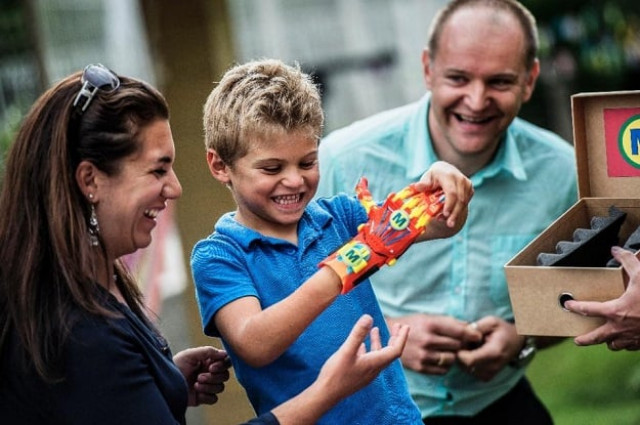French boy gets 'superhero' 3-D-printed prosthetic hand
The prosthetic attaches via velcro and can grasp objects when the user bends his or her wrist

A boy, born with a right hand malformation, tries on his new 3D-printed hand given to him by the Association for the Study and Assistance of Child Amputees on August 17, 2015 in Cessieu. PHOTO: AFP
"He is going to have a superhero hand the colour of his choice, that he can take off when he wishes" said his mother Virginie.
"It will be fun for him on the school yard with his friends."
The prosthesis comes through an American foundation called e-NABLE, which since 2013 has been connecting owners of 3D printers with families of children missing fingers or hands.
More than 1,500 prostheses have already been provided through the foundation, and the hand for Maxence was the groups first in France.
The device, which is worn like a glove and attaches with Velcro, cost less than 50 euros ($55) to produce and can easily be replaced with a larger model as the boy grows up.
It is designed for children who, like Maxence, have a wrist and a palm. The artificial hand grasps objects when the user bends his or her wrist, and is attached without surgery.
The prosthesis does not allow for more precise activities like tying shoes, but does allow users to do things like riding on swings or a scooter that are difficult to do without fingers.
According to Thierry Oquidam, the volunteer who produced the prosthetic, the advantage of the hand is its "fun" aspects which can make the child feel like he is dressed up in a costume instead of wearing a medical prosthesis.
Maxence is among the roughly 100 children born each year in France with one or more malformed limbs.
His condition is a result of agenesia -- the failure of a limb to develop while a child is in the womb.
Yet since birth, Maxence -- who lives with his family in Cessieu in southeastern France -- has found a way to get by with just one hand, his family said.
For the moment prostheses like Maxence's have neither been tested nor approved by France's health authorities. But this did not dampen support for the device among its supporters.
Oquidam said "just like Uber completely changed how we use transportation... 3D printing is completely changing the approach of certain professions, in particular medicine."



















COMMENTS
Comments are moderated and generally will be posted if they are on-topic and not abusive.
For more information, please see our Comments FAQ